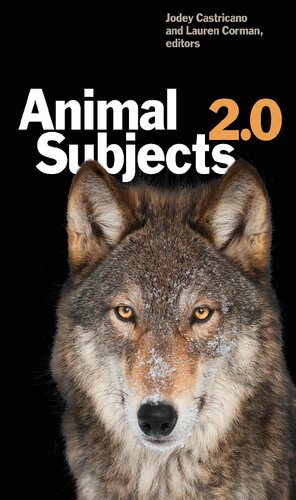

Most ebook files are in PDF format, so you can easily read them using various software such as Foxit Reader or directly on the Google Chrome browser.
Some ebook files are released by publishers in other formats such as .awz, .mobi, .epub, .fb2, etc. You may need to install specific software to read these formats on mobile/PC, such as Calibre.
Please read the tutorial at this link: https://ebookbell.com/faq
We offer FREE conversion to the popular formats you request; however, this may take some time. Therefore, right after payment, please email us, and we will try to provide the service as quickly as possible.
For some exceptional file formats or broken links (if any), please refrain from opening any disputes. Instead, email us first, and we will try to assist within a maximum of 6 hours.
EbookBell Team

4.4
22 reviewsAnimal Subjects: An Ethical Reader in a Posthuman World (WLU Press, 2008) challenged cultural studies to include nonhuman animals within its purview. While the “question of the animal” ricochets across the academy and reverberates within the public sphere, Animal Subjects 2.0 builds on the previous book and takes stock of this explosive turn. It focuses on both critical animal studies and posthumanism, two intertwining conversations that ask us to reconsider common sense understandings of other animals and what it means to be human.
This collection demonstrates that many pressing contemporary social problems―how and why the oppression and exploitation of our species persist―are entangled with our treatment of other animals and the environment. Decades into the interrogation of our ethical and political responsibilities toward other animals, fissures within the academy deepen as the interest in animal ethics and politics proliferates.
Although ideological fault lines have inspired important debates about how to address the very material concerns informing these theoretical discussions, Animal Subjects 2.0 brings together divergent voices to suggest how to foster richer human–animal relations, and to cultivate new ways of thinking and being with the rest of animalkind. This collection demonstrates that appreciation of difference, not just similarity, is necessary for a more inclusive and compassionate world. Linking issues of gender, disability, culture, race, and sexuality into species, Animal Subjects 2.0 maps vibrant developments in the emergent fields of critical animal studies and posthumanist thought.